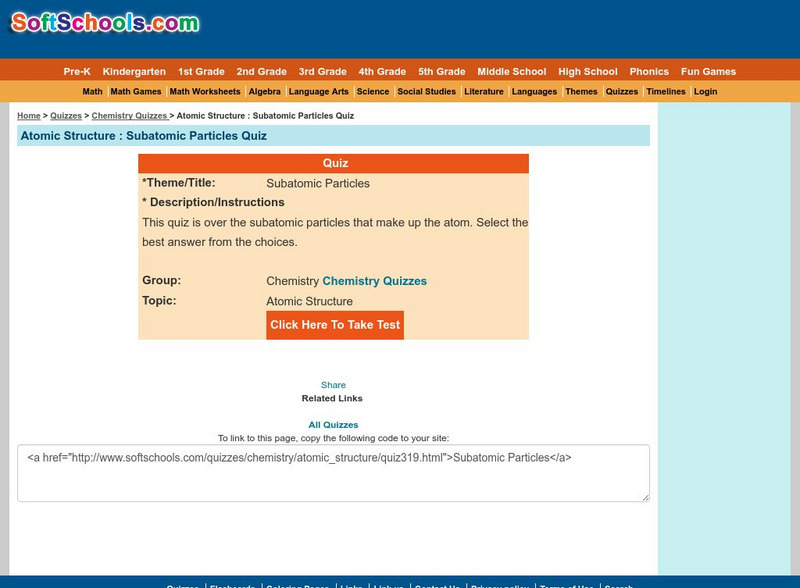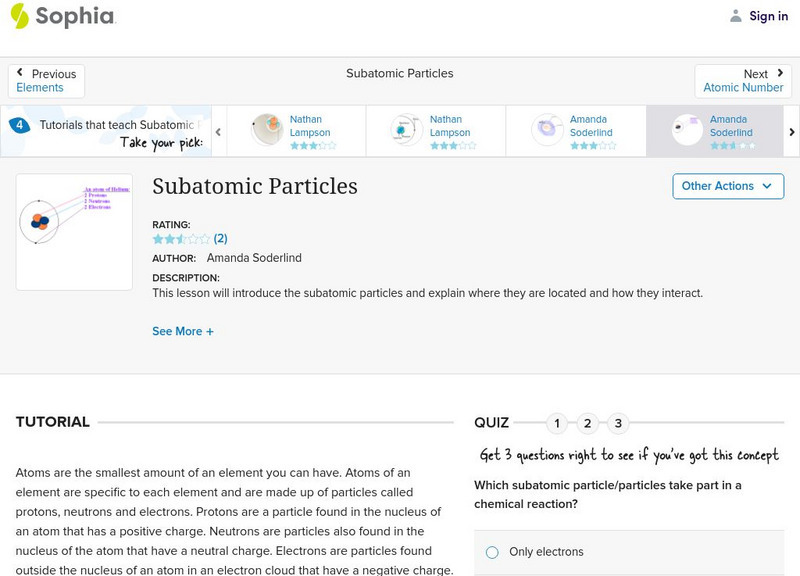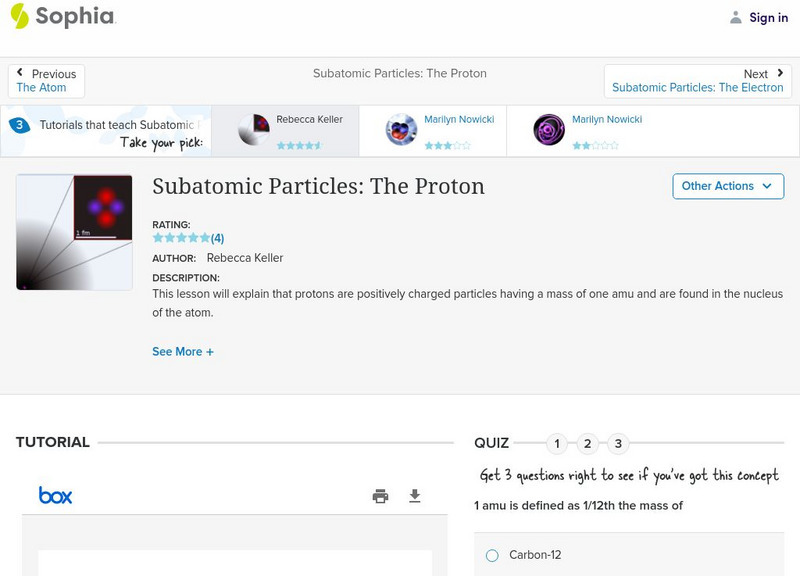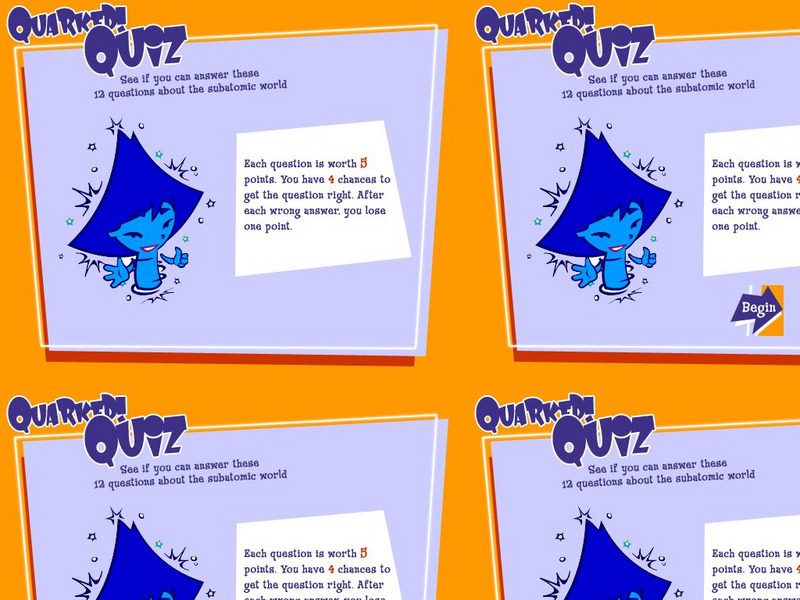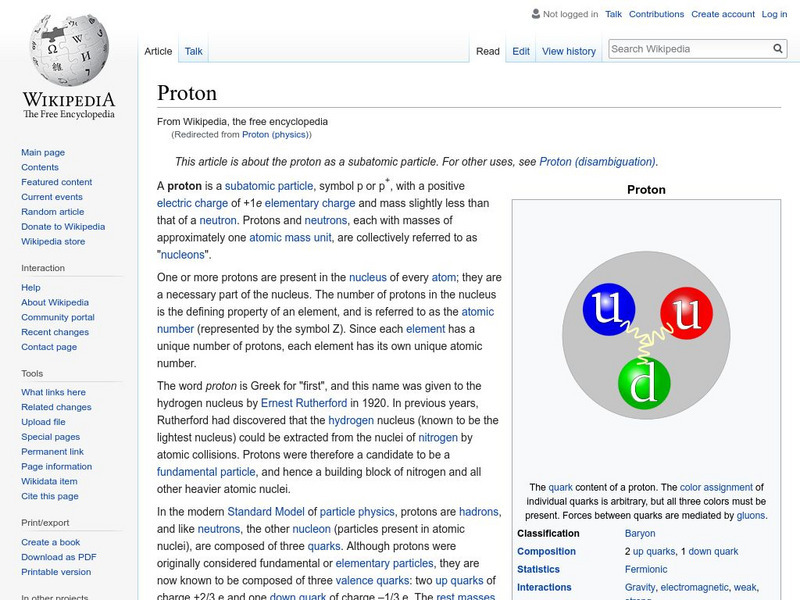CK-12 Foundation
Ck 12: Physics Simulation: Subatomic Particle Zoo
[Free Registration/Login Required] Learn about the most basic particles of matter, including quarks and leptons, and the four fundamental interactions using this interactive simulation. A PDF worksheet is also available.
Sophia Learning
Sophia: Subatomic Particles: Lesson 2
Describe the $ifference between the subatomic particles, including their masses, locations, and charges. This lesson is 2 of 7 in the series titled "Subatomic Particles."
Soft Schools
Soft Schools: Subatomic Particles Quiz
Take this interactive, multiple-choice quiz over subatomic particles, then review your score and any missed questions at the end.
Sophia Learning
Sophia: Subatomic Particles: Lesson 3
This lesson will introduce the subatomic particles and explain where they are located and how they interact. It is 3 of 7 in the series titled "Subatomic Particles."
Sophia Learning
Sophia: Subatomic Particles: Lesson 4
This lesson will introduce the subatomic particles and explain where they are located and how they interact. It is 4 of 7 in the series titled "Subatomic Particles."
Sophia Learning
Sophia: Subatomic Particles: Lesson 6
This lesson will introduce the subatomic particles and explain where they are located and how they interact. It is 6 of 7 in the series titled "Subatomic Particles."
Sophia Learning
Sophia: Subatomic Particles: Lesson 7
This lesson will introduce the subatomic particles and explain where they are located and how they interact. It is 7 of 7 in the series titled "Subatomic Particles."
Sophia Learning
Sophia: Subatomic Particles: Lesson 5
Describe the difference between the subatomic particles, including their masses, locations, and charges. This lesson is 5 of 7 in the series titled "Subatomic Particles."
Sophia Learning
Sophia: Subatomic Particles: The Electron: Lesson 3
This lesson will explain that electrons are negatively charged particles with negligible mass and are found in pairs in orbitals surrounding the nucleus of an atom. It is 3 of 3 in the series titled "Subatomic Particles: The Electron."
Sophia Learning
Sophia: Subatomic Particles: The Proton: Lesson 2
This lesson will explain that protons are positively charged particles having a mass of one amu and are found in the nucleus of the atom. It is 2 of 3 in the series titled "Subatomic Particles: The Proton."
Sophia Learning
Sophia: Subatomic Particles: The Neutron: Lesson 2
This lesson will explain that neutrons are particles in the nucleus that have no charge and a mass of one amu. It is 2 of 3 in the series titled "Subatomic Particles: The Neutron."
CK-12 Foundation
Ck 12: The Nuclear Model of the Atom
[Free Registration/Login may be required to access all resource tools.] In the following online tutorial students will distinguish between the three main subatomic particles and understand the contributions of J. J. Thomson, Robert...
Georgia Department of Education
Ga Virtual Learning: Ap Chemistry: Atomic Theory
In this module students explore how matter is classified, the history of atomic theory, subatomic particles, modern atomic theory, electron configuration, the periodic table and its trends, and spectroscopy.
Other
Fermilab: What Are the Basic Forces Between Particles?
Get an introduction to the four forces that interact between atomic particles. With the help of a simulation you'll see how building reconstruction would be affected without each of the forces.
Other
University of Kansas: Quarked!: Quiz
A twelve-question quiz about quarks and other subatomic particles, with links to games and other activities on the website.
Frostburg State University
General Chemistry Online: Atoms, Elements, and Ions Faq
Get the skinny on all things frequently asked about isotopes, subatomic particles and atomic theory. Find out what a "dalton" is or the difference between Na+ and Na.
Wikimedia
Wikipedia: Proton
Wikipedia offers information on the proton, a subatomic particle with a positive electric charge. Many hyperlinked terms.
OpenStax
Open Stax: Structural Organization of the Human Body
Try considering the structures of the body in terms of fundamental levels of organization that increase in complexity: subatomic particles, atoms, molecules, organelles, cells, tissues, organs, organ systems, organisms and biosphere....
CK-12 Foundation
Ck 12: Physical Science: Atoms
[Free Registration/Login may be required to access all resource tools.] Atoms and how they are related to elements, and the particles that make up atoms.
Other
University of Kansas: Quarked!: Subatomic Match
Match the Quarkster characters by identifying which of six different traits and three colors they have in common.
Other
University of Kansas: Quarked!: Rummy
A card game where you must combine different types of quarks in order to make baryon particles, or to make particle decay chains.
Other
University of Kansas: Quarked!: Word Search
A word search with vocabulary related to the study of subatomic science.
Other
University of Kansas: Quarked!: Baryon Blaster
Try to fill each SUV with the right kinds of quarks as it travels across the screen, in order to make different types of baryon particles. The game becomes more challenging as you progress through the levels.
Symmetry Magazine
Symmetry Magazine: Explain It in 60 Seconds: The Intensity Frontier
This article briefly describes the Intensity Frontier, one of several research approaches to the area of particle physics.


